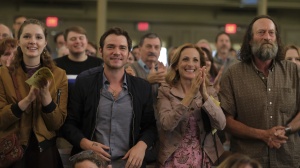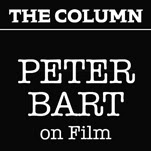Pre-Oscar week always spells angst for Hollywood, but will voters feel better if a “feel good” movie is crowned Best Picture?
The debate about CODA epitomizes that moment each year when the studios get grumpy about the omniscient streaming moguls and the film nerds complain that the “big spend” distorts voting preferences.
The Academy, meanwhile, asks: Has anyone really seen the movies? In fact, many Oscar voters this week are still playing catch-up while wondering why the rules of the game keep changing.
It seems like only yesterday when the studios were studying how to ban streamers, not embrace them. They were also still throwing lavish parties for voters – especially Golden Globe voters (remember them?).
All the while the cast of characters has kept changing. Ted Sarandos invested big bucks to promote Roma in 2018 to remind us of Netflix’s expanding ubiquity. Only a year earlier, the mercurial Elon Musk had performed a similar ritual on behalf of The Big Sick. Neither Amazon nor Netflix were across-the-board winners at the time.

Apple Original Films
Hollywood also remembers when Disney boss Michael Eisner went full throttle to win the 1994 Oscar for Pulp Fiction. Disney had just spent $60 million to buy Harvey Weinstein’s Miramax to win some kudos, but it failed to bump Forrest Gump.
Critics at the time complained that box office results played too big a role in determining Oscar voting – hence hits like Oliver consistently got the big prize. There’s no danger today of history repeating itself: Neither CODA nor The Power of the Dog registered magic at the ‘plexes.
The defining insight into Oscar 2022 for me occurred when I bought my ticket to West Side Story and ended up watching it with an audience of five. When would people wake up again?
30-Plus Years Of Best-Picture Winners: Photos
Writers Guild voters awakened last week to realize that they could not vote for the brilliant Norwegian comedy-drama with the appalling title The Worst Person in the World. Even Belfast was ruled off limits for similar technicalities.
The bottom line, of course, is that the basic apparatus of hit-making — the festivals and the interview circuit – were by and large missing in action.
Even the ghost of Harvey Weinstein suddenly flashed before us, however disturbing that might be.
Opprobrium was heaped on him for his over-the-top campaigns on behalf of films like Shakespeare In Love and The King’s Speech. There was just too much noise and intrigue. Yet now voters and filmmakers alike are coping with the opposite end of the spectrum: The sounds of silence.
Clearly the voices of the artists are needed to promote, and defend, their work. And the process had become increasingly unwieldy.
During the 2008 Oscar season, Kathryn Bigelow wondered aloud whether she had made the right choice in casting aside her creative agenda to focus on promoting The Hurt Locker. She won, but it cost her.
A similar question was put to Ken Branagh this year, who has worked diligently to draw attention to Belfast. And he, too, asks, “Has anyone seen my movie?”
Gil Cates, who deftly produced 14 consecutive Oscar shows, used to explain that he’d loved the circus as a child and, to him, the Oscars represented circus time. There were leaps and there were falls, but the audience enjoyed it. When there was an audience.

